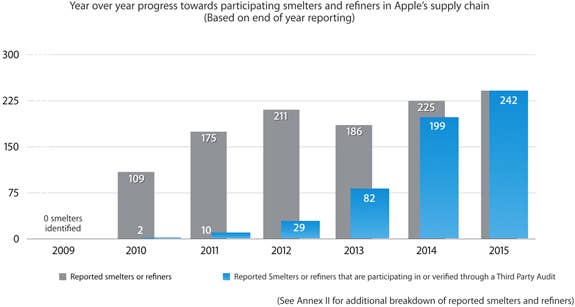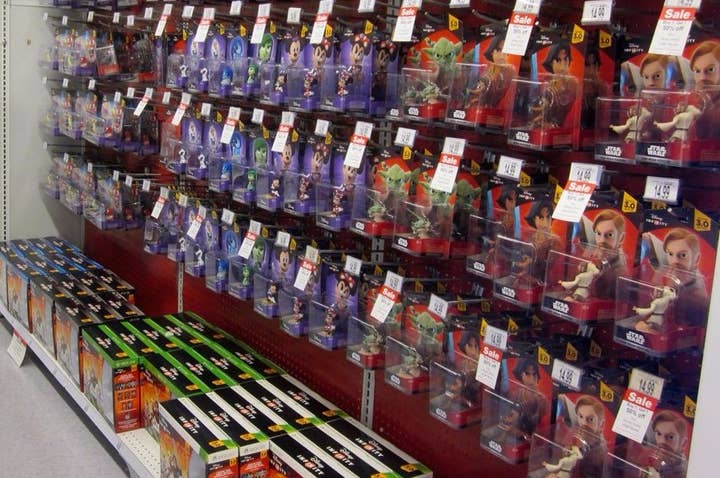Conflict mineral sourcing still hazy for games industry
Apple and Microsoft make significant improvements in their supply chains as Activision backslides; Time Warner and Facebook in apparent violation of SEC rules
Last year, Activision Blizzard set the standard in the games industry when it came to conflict minerals reporting. While platform holders with larger supply chains for tantalum, tin, tungsten and gold (3TG) had trouble even identifying where those resources were coming from, Activision Blizzard was alone in its ability to say there was no reason to believe its products containing conflict minerals were funding war crimes and armed groups in the Democratic Republic of the Congo.
That's no longer the case. In accordance with Securities and Exchange Commission requirements, the publisher this week filed an annual update of its use of 3TG, which it needs to make Skylanders and Guitar Hero products. For 2014, all 16 of Activision Blizzard's product suppliers returned a Conflict-Free Sourcing Initiative (CFSI) survey detailing their own sources of minerals, none of which came from DR Congo or neighboring countries. For 2015, only 14 of the company's 16 suppliers completed the survey, "despite multiple follow-up requests" from the company.
Those 14 suppliers provided Activision Blizzard with a list of 18 smelters and refiners from which they obtained their 3TG, only 16 of which were certified as conflict-free by the CFSI's Conflict-Free Sourcing Program (CFSP) or in the process of becoming certified.
Apple has 242 smelters or refiners in its supply chain, and every last one is participating in a third-party audit program to ensure their 3TG is conflict-free
"Based on information provided by our suppliers, as well as information from publicly available sources, we believe that one of the CFSP-compliant smelters in our supply chain may source tin from the Covered Countries (specifically, from Rwanda or the Katanga Province of the Democratic Republic of the Congo)," Activision Blizzard said. "At this point, we have not determined the country of origin of the 3TGs supplied by the other 'upstream' smelters and refiners in our supply chain or, if so, whether such minerals were from recycled or scrap sources or directly or indirectly financed conflict in the Covered Countries."
While Activision Blizzard backslid in 2015, other companies we looked at have thankfully been improving their sourcing practices. Apple in particular deserves credit for its work improving on a much larger supply chain. In 2014, the company identified 225 smelters or refiners providing it with 3TG, but only 199 of them were conflict-free, or in the process of becoming compliant. Of those remaining, four had their contracts terminated and the rest were given a deadline of the end of the year to begin the compliance process.
That approach seems to have worked, as Apple's latest conflict minerals report shows that it has 242 smelters or refiners in its supply chain, and every last one is participating in a third-party audit program to ensure their 3TG is conflict-free. The company credited its progress not just to the strict enforcement of deadlines and participation (as seen by the previous year's terminated contracts), but also to having Apple personnel become familiar with the situation on the ground in DR Congo and surrounding countries. As part of that effort, it has also hired independent third parties to investigate reported incidents surrounding its supply chain.

"Apple has received confirmation that three incidents linked to smelters reported in Apple's supply chain have occurred in which individuals identified as members or potential members of organizations within the meaning of 'armed groups'..., in particular the police in the DRC and the DRC national army, were alleged to be involved. Each incident appears to have involved no more than a few individuals in isolated theft, illegal tax or similar criminal activity, potentially for personal gain, and, based on information received to date, the alleged perpetrators have been sanctioned or the specific incident has otherwise received some level of official redress by the local authorities. Apple continues to actively investigate the follow-up actions that have been taken to address these incidents."
Apple has said it has provided a number of local programs with funding in order to ensure responsible sourcing and will continue to pressure smelters and refiners it works with to improve compliance with conflict-free audit programs. However, it also recognized a broader change that needs to take place that "will only be possible with continued strategic collaboration across law enforcement, governments, non-governmental organizations and multiple industries."
Microsoft is another company that has made improvements in recent years. For one thing, 97 percent of its 276 suppliers returned the company's survey this year, compared to just 82 percent last year. While Microsoft says it has an "escalation process" that can result in suppliers having their contracts terminated for not participating, it has yet to exercise that option.
So for suppliers that have routinely ignored Sony's inquiries over years, just know that "responsible" Sony execs are prepared to send you more inquiries to ignore
Regardless, the results of those surveys have also been trending better, as Microsoft identified 302 smelters or refiners, and 85 percent were compliant or in the process of becoming compliant with CFSP standards. That's up from 73 percent last year, and 60 percent in 2013.
But at least Microsoft seems to have the goal of conflict-free minerals sourcing in sight. Sony likewise needs improvement, but it's unclear just how bad the company's visibility into its supply chain really is. Sony's disclosure made no mention on how many direct suppliers it surveyed, but it did specify not all of them returned survey requests. And while the company boasted of a remediation plan that can result in the immediate cancellation of a contract, it's clearly not a first option for business partners who can't even be bothered to return a survey.
"Responsible Management intends to communicate, either directly or through other Sony group employees, with suppliers that have not responded to our requests over years to ask for their cooperation with the [Conflict Minerals Reporting Template]."
So for suppliers that have routinely ignored Sony's inquiries over years, just know that "responsible" Sony execs are prepared to send you more inquiries to ignore. (Or have "other Sony group employees" do it for them. I mean, these are executives; they need to spend their time on the important stuff, not this whole "preventing war crimes" fluff.)
As for the suppliers who did respond, they collectively identified 286 smelters or refiners in Sony's supply chain for 2015, 85 percent of which are certified conflict-free or at least in the auditing process. That's an improvement from 2014, when suppliers identified 214 smelters or refiners, and only 80 percent of them were conflict-free.
The good news with Disney is that the company has abandoned the toys-to-life market, which means one less line of products that could use unethically sourced 3TG in the future
Last and once again least, there's Disney. The good news with Disney is that the company has abandoned the toys-to-life market, which means one less line of products that could use unethically sourced 3TG in the future. The bad news is that the company has shown minimal improvement.
Disney identified a massive 1,320 suppliers of retail merchandise, but only 54 percent of them returned the company's surveys (up from 40 percent in 2014). The majority of those non-responsive suppliers may not work with 3TG, but it remains concerning that Disney cannot compel its business partners to even answer an inquiry.
Perhaps more concerning are the answers to the inquiries that do get returned. The number of suppliers who use conflict minerals in Disney merchandise shot up from 22 in 2014 to 76 last year. At the same time, the number of suppliers who could convincingly say their business didn't support war crimes held steady at just three. Another 12 said their 3TG didn't come from the Congo or its neighboring countries, but didn't provide enough supply chain information to convince Disney those claims were reliable. The remaining 61 suppliers simply said they couldn't account for the provenance of their raw materials.
As sad as those numbers are, Disney has shown slight improvements in outlining its supply chain. In 2014, 87 percent of the 122 smelters and refiners identified as providing conflict minerals were compliant with CFSI standards. For 2015, Disney identified 160 such operations in its supply chain, 98 percent of which were compliant. Those numbers would be considerably more comforting if Disney's upstream suppliers weren't either ignoring the company's inquiries or pleading ignorance as to where they got their conflict minerals.
We'd like to provide an update on Nintendo's progress when it comes to sourcing 3TG, but we can't. The company doesn't file conflict minerals disclosures with the Securities and Exchange Commission, so we've had to rely on its annual Corporate Social Responsibility Report instead. But at this point, its last CSR report was over a year ago, and Nintendo representatives have not yet responded to our inquiry as to when a 2016 update might be forthcoming, or what progress the company had made in conflict minerals sourcing. For 2014, the company had a 100 response rate from suppliers, but only 168 of the 247 refiners and smelters in its supply chain were certified as conflict-free.
Facebook and Time Warner are two more companies that we'd like to include here as a result of the Oculus Rift and Lego Dimensions products, but neither has filed disclosures with the SEC yet. SEC rules require companies whose products require conflict minerals to file such forms by May 31 of the following year. As of this writing, neither company has responded to our requests for comment, or why they might be exempt from such requirements.
[UPDATE - June 9]: A Nintendo representative provided the following statement to GamesIndustry.biz: "Nintendo has an unequivocal policy banning use of 'conflict minerals' in our products. Our CSR reports detail our efforts on this issue, and we expect to publish the 2016 report on our website in the near future."
Photo credit: 8-bit central.

